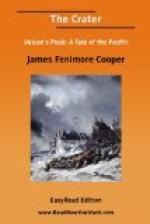Lunt.
For some months after the change of government, Mark Woolston was occupied in attending to the arrangement of his affairs, preparatory to an absence of some length. Bridget had expressed a strong wish to visit America once more, and her two eldest children were now of an age when their education had got to be a matter of some solicitude. It was the intention of their father to send them to Pennsylvania for that purpose, when the proper time arrived, and to place them under the care of his friends there, who would gladly take the charge. Recent events probably quickened this intention, both as to feeling and time, for Mark was naturally much mortified at the turn things had taken.
There was an obvious falling-off in the affairs of the colony from the time it became transcendantly free. In religion, the sects ever had fair-play, or ever since the arrival of the parsons, and that had been running down, from the moment it began to run into excesses and exaggerations. As soon as a man begins to shout in religion, he may be pretty sure that he is “hallooing before he is out of the woods.” It is true that all our feelings exhibit themselves, more or less, in conformity to habits and manners, but there is something profane in the idea that the spirit of God manifests it presence in yells and clamour, even when in possession of those who have not been trained to the more subdued deportment of reason and propriety. The shouting and declamatory parts of religion may be the evil spirits growling and yelling before they are expelled, but these must not be mistaken for the voice of the Ancient of Days.
The morals decayed as religion obtained its false directions. Self-righteousness, the inseparable companion of the quarrels of sects, took the place of humility, and thus became prevalent that most dangerous condition of the soul of man, when he imagines that he sanctifies what he does; a frame of mind, by the way, that is by no means strange to very many who ought to be conscious of their unworthiness. With the morals of the colony, its prosperity, even in worldly interests, began to lose ground. The merchants, as usual, had behaved badly in the political struggle. The intense selfishness of the caste kept them occupied with the pursuit of gain, at the most critical moments of the struggle, or when their influence might have been of use; and when the mischief was done, and they began to feel its consequences, or, what to them was the same thing, to fancy that the low price of oil in Europe was owing to the change of constitution at the Crater, they started up in convulsed and mercenary efforts to counteract the evil, referring all to money, and not manifesting any particular notions of principles concerning the manner in which it was used. As the cooler heads of the minority—perhaps we ought to say of the majority, for, oddly enough, the minority now actually ruled in Craterdom, by carrying out fully the principle of the sway of the majority—but, as the cooler heads of the colony well understood that nothing material was to follow from such spasmodic and ill-directed efforts, the merchants were not backed in their rising, and, as commonly happens with the slave, the shaking of their chains only bound them so much the tighter.




